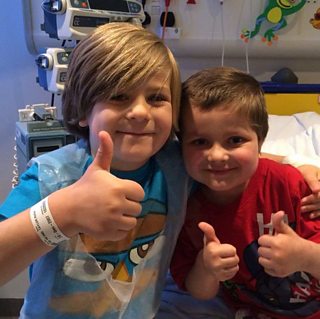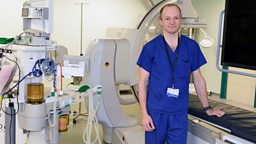Dollan Cannell: "You feel very honoured to be close to the extraordinary moments in people's lives"
Producer Dollan Cannell talks about his experiences of working on the third series of Great Ormond Street, including the challenge of filming with the young patients and the pioneering treatments they receive at the hospital.
What's the atmosphere like at Great Ormond Street?

You've got to film the story, but you are desperately hoping that they are ok
Great Ormond Street is an extraordinary place. I've filmed in a lot of hospitals but the dedication of all the staff really stands out. Many of the children have very serious conditions and families know that Great Ormond Street is probably their last chance of a cure. The stakes are often extremely high.
A lot of the doctors talk about the balance betweeen being very objective and hard-headed on the one hand and being caring and sensitive on the other. Some described having to temporarily cut off the more emotional side of it in order to be able to deal with a case in the best possible way.
The patients are children, can you tell me a bit about the relationships you built with them?
You will take it very gently and you try and get to know them as well as you can. You try and encourage them to be able to tell the story in their own way, so they feel like they can express themselves and you try to be as sensitive as possible when they are going through difficult things. You build a close relationship so you find yourself quite wrapped up in how they are cared for and how it is going and I suppose you are kind of wearing two hats; you are wearing the hat of a filmmaker, who knows you've got to film the story, but you are also desperately hoping they are ok.
That must be an interesting balance to try and achieve...
Yes. I think when you go through any documentary people are going through very difficult things, the very last thing you want to do is be extra difficulty, so you try to make sure that your presence is positive.
Were there any particular moments that stand out for you?
One of the most extraordinary programmes I made is about children who have lung transplants. Lung transplants in children are extremely rare - Great Ormond Street does most of the lung transplants for children in the UK - they do five or eight a year roughly. It is a very extreme measure to take with children for obvious reasons, and once they have taken the decision that a child must have a lung transplant, they can't predict when an organ becomes available - often it can take many months or even years. The great privilege of this series is we were able follow some cases from the point where the decision was made until a transplant came through.
Those were quite extraordinary moments. While the transplant process can be very risky, if it goes well, it will completely transform a child's life for the better. I remember saying to a doctor after a transplant, "How is it going? I realise they are not going to be able to run a marathan", and she said, "Well you say that [but] actually they could!" These are extraordinary moments in people's lives; you feel very honoured to be close to that.

To what extent did you know which stories you were following?

You have a lot of discussions with the medical team beforehand to work out as best as you can which stories might be good ones to follow, but to a large extent they don't know and you don't know how a case is going to go, and also whether it's going to be appropriate and right to follow a particular family. They don't know what circumstances they are going to be in and how they are going to react to it, so there's a huge amount of unknowns and you have to follow quite a number of cases to make sure you've got the right ones.
How much of the treatment process could you follow?
We were there all the way. There was a good relationship of trust with medical teams, so we were allowed access to the whole process. So both from the family's side and the medical side you are able to be very close to it, so at every stage of their stories.
What other conditions were the most common ones that you came across?
There is this extraordinary condition called , this is a very rare condition that only Great Ormond Street and one other centre in the UK treat and essentially it's a congenital malformation of the blood vessels in the brain. If untreated it will very likely cause the death of the child - often a small baby - so they absolutely have to treat it. The only treatment is riskier than anything I've personally encountered in any field of medicine. When the doctors treat there is a roughly one third chance that the child will be completely cured; there is a one third chance that the child will have a bleed to the brain end up with some mental impairment; and there is a third chance that the child won't survive.
The doctors have no option but to undertake this treatment when they know that quite often these poor children won't make it through. In an era like ours, when you often hear about medicine becoming more risk-averse, it was humbling to see these doctors going through this incredibly risky treatment again and again.
